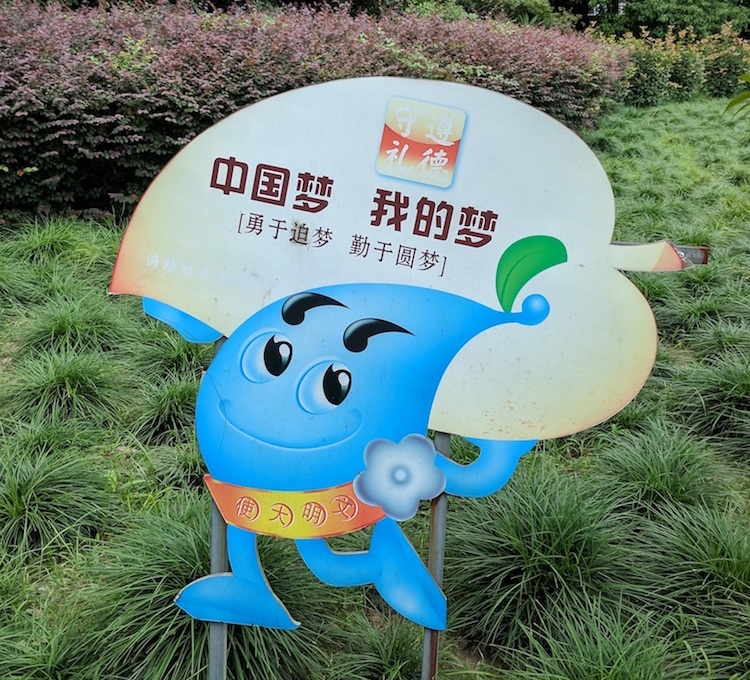Correction of a public sign
« previous post | next post »
Photograph taken by Adrian Thieret in Shanghai (Pudong) about a month ago.
The writing on the sign says, from the top to the bottom:
zūn dé shǒu lǐ 遵德守礼 ("abide by morality and propriety")
Zhōngguó mèng 中国梦 ("China's dream")
wǒ de mèng 我的梦("my dream")
yǒngyú pò mèng 勇于迫梦 ("be brave in pressing close to [your] dream")
qín yú yuánmèng 勤于圆梦 ("be diligent in fulfilling [your] dream")
wénmíng dàshǐ 文明大使 ("civilized ambassador")
Everything else on the sign seems fine, but "yǒngyú pò mèng 勇于迫梦" ("be brave in pressing close to [your] dream") sounds off. Instead, one would expect "yǒngyú zhuī mèng 勇于追梦" ("be brave in pursuing [your] dream"). One's intuition is borne out by their respective ghit counts — 3 versus 134,000.
Visually, pò 迫 ("force; compel; press [upon]; approach") and zhuī 追 ("pursue; chase") resemble each other so much that many readers who encounter "yǒngyú pò mèng 勇于迫梦" ("be brave in pressing close to [your] dream") will actually read it as "yǒngyú zhuī mèng 勇于追梦" ("be brave in pursuing [your] dream"), not even noticing that the zhuī 追 is really pò 迫.
So how do we account for the "error" (I'm not quite willing to say that it really is an error until we consider the further evidence that I will adduce below).
The substitution of pò 迫 ("force; compel; press [upon]; approach") for zhuī 追 ("pursue; chase") could not have occurred through phonetic inputting, whether Hanyu Pinyin or voice recognition, because the sounds of the two characters are completely different.
A more likely explanation is that the substitution occurred due to shape-based inputting, whether strokes entered through the keyboard or writing of the characters on a pad or glass. See:
- "Chinese character inputting" (10/17/15; includes references to earlier posts related to inputting)
- "Stroke order inputting" (10/30/11)
- "Voice recognition for English and Mandarin typing" (8/24/16)
- "Voice recognition vs. Shandong accent" (3/1/15)
- "Easy versus exact" (10/14/17)
- "Voice recognition for inputting" (10/22/17)
But there is yet another completely different explanation for the "correction" that is possible for the substitution of pò 迫 for zhuī 追. Let me begin this train of thought by saying that, upon reading the questionable line of the sign, I had the following reactions in this sequence:
- "yǒngyú pò mèng 勇于迫梦" ("be brave in pressing close to [your] dream") didn't sound right
- I thought that it should instead be "yǒngyú zhuī mèng 勇于追梦" ("be brave in pursuing [your] dream")
- scrutinizing the pò 迫, I noticed that it appears to be smudged, as though someone had tried to change it
My observations were substantiated by these remarks of Adrian:
The scuffs you see on the 迫 are, as far as I can surmise, the result of a 追 sticker being placed over top of it and then later peeled off by someone who preferred 迫. That hypothesis is based on seeing an identical sign nearby with a 追 sticker on top of what was presumably a 迫 underneath. Unfortunately I forgot to take a picture of the corrected sign and don't remember where exactly I found it.
This led me to question why someone would prefer pò 迫 over zhuī 追. Since this sign is in Shanghai, I conjectured that there was interference from Shanghainese, that perhaps Shanghainese speakers do not use zhuī 追 to express the meaning "pursue". When I asked a native Shanghainese speaker if that might possibly be the case, she told me that indeed they do not use zhuī 追 to express the notion of "pursue" in spoken Shanghainese, but they would use expressions involving gēn 跟 or xún 寻.
For similar corrections of a public sign in Russia, see:
- "Patriarchal homestead" (9/18/17)
[Thanks to Yaoying Dai]

Brandon said,
October 25, 2017 @ 1:18 am
Someone could have peeled off the sticker simply out of curiosity at what lay beneath. After all, most passers-by would probably not know that it was 迫 under the 追, so how would they prefer one over another?
Bathrobe said,
October 25, 2017 @ 5:25 am
Interestingly, Japanese might use 夢に迫る yume ni semaru meaning 'draw close to your dreams' or 'approach your dreams'.
I think it's a bit of a long shot blaming Japanese influence, although it's possible (from anime, etc.), but is there any possibility of a topolectal influence?
Bathrobe said,
October 25, 2017 @ 5:29 am
Of course, I read half way and saw the string of links and thought that was the end of the post. So I guess there's no topolectal influence.
dainichi said,
October 25, 2017 @ 10:16 pm
> Japanese might use 夢に迫る
Do you have examples? All examples I can find on Google are the journalist jargon 迫る to say "we focus/zoom in on xxx's dreams". I'm not saying it can never mean "persue your dreams", but I think 夢を追う (yume o ou) is much more idiomatic.
Bathrobe said,
October 26, 2017 @ 1:53 am
Yes, you are right, most of the Japanese examples out there mean "focus on/ take a close look at someone's dreams".
There are a couple of examples where it means "closing in on one's dream" but they're fairly rare. These include examples of 永夢に迫る ('close in on one's eternal dream') and one example of 夢に迫った選手に拍手 ("applause for athlete who closed in on his dream") but it certainly isn't a common combination.
Neil Dolinger said,
October 27, 2017 @ 6:12 pm
I’d like to have a better understanding of the intended message of this sign. I am familiar with the use of 文明 in various signs exhorting the public not to spit, to stand closer to the urinal, etc. but in those cases the signwriters are somewhat clear in what behavior they are tying to a notion of “culture”. Since the “messenger” is a drop of water, I they might want us to conserve water, but who knows?